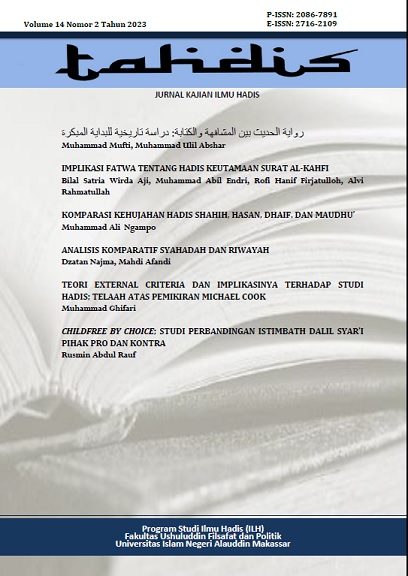Implikasi Fatwa Tentang Hadis Keutamaan Surat al-Kahfi
Abstract
Fatwa is seeking a syariah law in the form of a response from the person requesting a fatwa or a response to a problem that occurs. It aims to straighten out the beliefs and practices that are believed by Moslems. Reading Surah Al-Kahf is among the practices that many Moslems do in Indonesia. STDI Imam Syafi’i Jember community consists of people who are striving to spread and practice the demands of Islamic teaching. Among what is widely da’wah spread and practiced in this environment is reading Surah Al-Kahf on Fridays. This study aims to analyze and find the takhrij hadiths of the virtues of Surah Al-Kahf, fatwas about the hadith of the virtues of Surah Al-Kahf, and as well as the implications of the fatwas about the hadith of the virtues of Surah Al-Kahf to the STDI’s community. The research method used in this study is a qualitative approach with a case study type. This study finds that the hadiths of the virtues of Surah Al-Kahf comes from two narrations which mention in general and specifically on Fridays. The fatwas of the scholars regarding the sunnah of reading it on Fridays is divided into: (a) the basis of the hadith is weak but it is permissible to practice it, (b) the basis of the hadith is weak so it does not limit reading it on Fridays, and (c) the basis of the hadith is authentic. The implications of these fatwas for the STDI’s community are varied, some of whom consider the fatwa as another perspective in ijtihad and some who continue to practice it.
Authors who publish with this journal agree to the following terms:
(1) Authors retain copyright and grant the journal right of first publication with the work simultaneously licensed under a Creative Commons Attribution License that allows others to share the work with an acknowledgment of the work's authorship and initial publication in this journal.
(2) Authors are able to enter into separate, additional contractual arrangements for the non-exclusive distribution of the journal's published version of the work (e.g., post it to an institutional repository or publish it in a book), with an acknowledgment of its initial publication in this journal.
(3) Authors should sign copyright transfer agreement when they have approved the final proofs sent by Biogenesis prior the publication.







